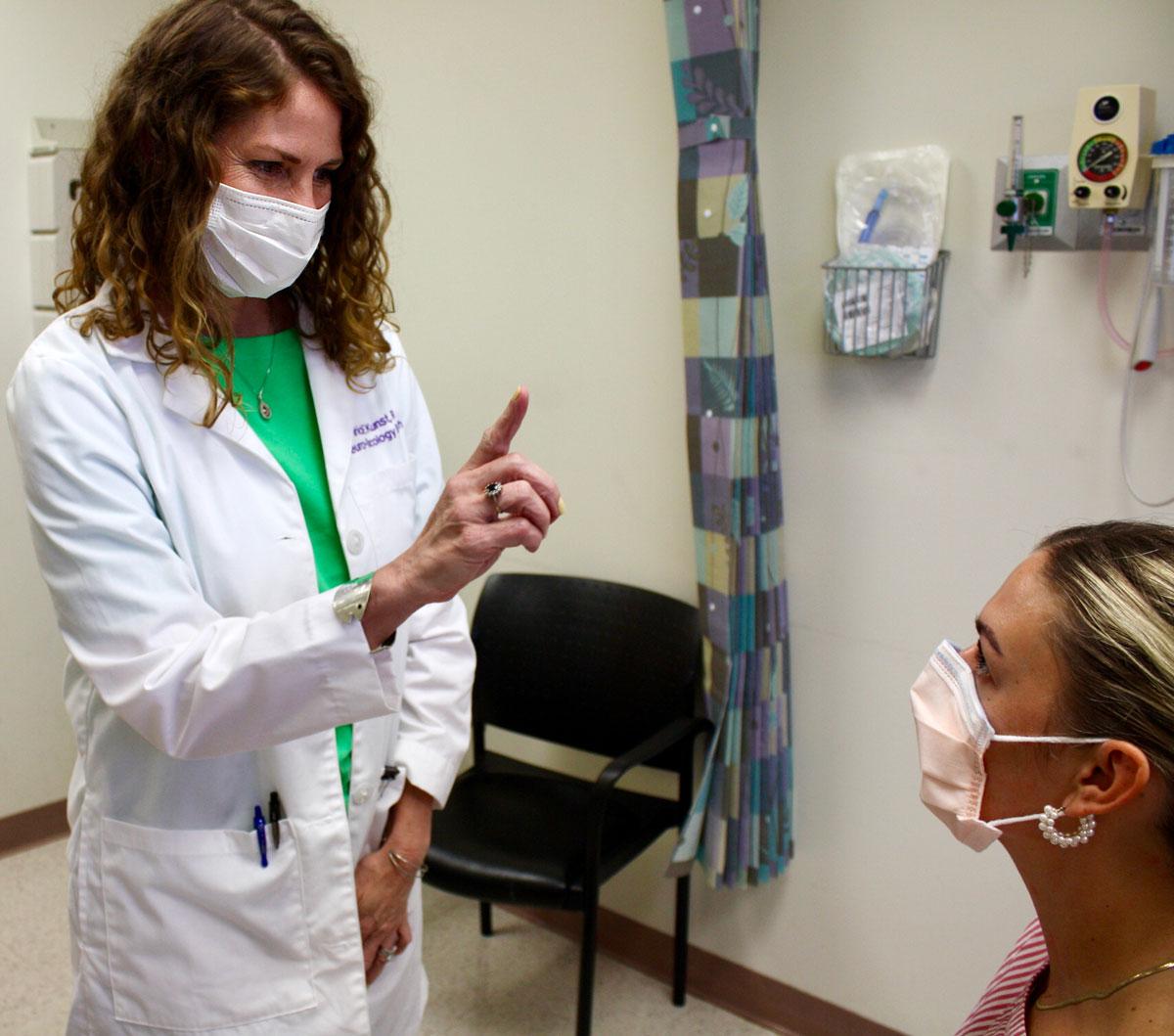By coordinating the experimental treatment and care of people with brain and spine tumors participating on clinical studies, research nurses in the Neuro-Oncology Branch are helping advance therapies and patient outcomes.
Rebecca Zacuto, Communications Fellow
November 9, 2023
Research nurses are an integral part of the clinical care team in the NCI Center for Cancer Research’s Neuro-Oncology Branch (NOB). Serving as liaisons, they connect people with brain and spine tumors to clinical trials—helping them understand and participate in trials and coordinating all aspects of their care—and ensure that the studies are performed accurately.
The four NOB research nurses—Tricia Kunst, Christine McGowan, Kelly Fernandez, and Kathleen Wall—have a unique and complex responsibility in caring for people with rare cancers. Primary brain and other central nervous system (CNS) cancers account for less than 2% of all new cancer cases per year in the United States. This rare patient population faces distinct disease- and treatment-related challenges and symptoms.
There are limited standard guidelines to treat rare brain and spine cancers, so many NOB clinical trials provide hope by testing new treatment approaches. There are also other NOB clinical studies that do not involve testing new treatments. They are designed to gather information about diseases for research, which can be important for understanding symptoms and quality of life.
“Clinical trials are important because they lay the groundwork for tomorrow’s medicine,” McGowan says. “Most cancer patients who seek help in a research setting are dealing with very serious illness and have been told by outside hospitals that there is nothing for them. I have found that it’s so important to never lose sight of the person behind the illness.”
The Glue of Clinical Trials
NOB research nurses are the glue of a clinical trial. They collaborate with a variety of personnel to support the smooth implementation of clinical trials for the participating patients and the entire clinical team. This makes their responsibilities a mix of patient-facing and behind-the-scenes work.
First, patients who come to the Neuro-Oncology Clinic at NIH meet with a neuro-oncologist for a consultation. During this visit, the neuro-oncologist or nurse practitioner may identify the patient as potentially eligible for a clinical trial and inform the patient. Then, a research nurse comes in to steer the process and becomes the primary point of contact for the patient. This involves three main responsibilities: patient education, clinical trial management, and provision of care.
The research nurse helps educate the patient about the trial by explaining the logistical aspects and expectations of trial participation. This process ensures the patient has full knowledge of the clinical trial, which helps them make a decision about whether to participate.
Once a patient consents, the research nurse closely monitors them as they progress through the clinical trial process. The research nurse also coordinates and collaborates with the other clinical care staff to schedule imaging, lab tests, procedures, and other interventions that are required for the trial. In addition, a research nurse will oversee drug implementation and participant compliance, while carefully tracking patient symptoms and side effects.
“Our clinical research is unique because it involves comprehensive care that aids patients as they cope with the physical and emotional aspects of their disease,” Kunst says.
“Their hopes, fears, anxieties, and joys are important. How they experience therapies is important. Doing whatever we can to support them is important,” McGowan adds. She believes compassionate communications can make patients feel comfortable, hopeful, and confident with both the study and the research team.
Throughout the clinical trial process, the research nurses also write research reports on serious symptoms and the progress of the study to ensure it follows protocol. They are care providers, advocates, and educators. “We have a special continuity and rapport with patients because we are their main point of contact during the length of the clinical trial,” Wall shares.
Helping Win the Fight Against Cancer
There are two contrasting components in rare brain and spine tumor research: excitement and uncertainty. The nature of clinical trials is such that researchers aim to learn more about effective treatment options without knowing for certain if the treatment will benefit the patient.
This presents a challenge for research nurses as they explain to patients that a treatment trial may not have a direct benefit—or may cause unwanted side effects. However, being honest and transparent with patients is a key part of their job. It ensures patients are equipped with the knowledge necessary for clinical trial participation.
“I love that each patient interaction provides an opportunity to improve the lives of a patient or their family member—even if it is doing something small, like just taking the time to listen to them about how they are doing,” Fernandez says.
Notably, many patients feel empowered about being part of research that is bigger than themselves. This sentiment is also shared by research nurses. “I am motivated knowing that my work contributes to the future of medicine and the future health of patients,” Wall explains.
Kunst expresses a similar sentiment: “It’s so exciting to be a part of new therapeutic trials and share in the hope that the new therapy will work to help win the fight against cancer.”
The NOB research nurses’ hard work is rewarding. With the unique responsibility of caring for patients with brain and spine tumors comes a profound satisfaction. They contribute to science and improve the lives of patients through their attentive care.
Top image caption: From left to right, Tricia Kunst, Kelly Fernandez, Christine McGowan, and Kathleen Wall

